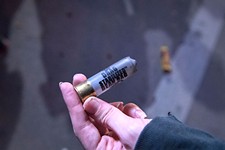APD Poised for Comprehensive Rape Case Audit
Council members call for “start to finish” review in wake of controversy
By Sarah Marloff, Fri., Jan. 25, 2019
Last week, Austin Police Chief Brian Manley announced that the department's handling of sexual assault cases – from the 911 call to case closure – will undergo a third-party audit. He isn't the only one calling for a comprehensive review; City Council Member Alison Alter's office confirmed that she will sponsor a resolution at the Jan. 31 Council meeting to direct the City Manager's Office to conduct a "start to finish" review of APD's full catalog of sexual assault cases from the past seven years.
Alter's office said the resolution, which has been in the works for "well over a month," will call for a retrospective look to identify root causes for how APD ended up with numerous misclassified cases, and recommendations on how to best move forward and avoid future mistakes. With the resolution, which should be posted by Friday, Alter asks not just for a third-party review as Manley has pledged, but for an evaluation conducted by a nongovernmental entity without ties to APD. (How that could be managed through the city's and APD's procurement process will likely be a topic of discussion at next week's meeting.) Grassroots advocate group Survivor Justice Project has applauded Alter and co-sponsors Greg Casar, Delia Garza, Ann Kitchen, and Mayor Steve Adler.
These moves follow the recent Texas Department of Public Safety audit requested by Manley, in the wake of local criticism and national headlines suggesting the department has been too quick to close cases that should be pursued in the cause of justice. The DPS team reviewed 95 sexual assault cases from 2017 to ensure the department was correctly using the federal "exceptional clearance" code for cases closed without an arrest. Under federal guidelines, four requirements must be met to close a case "exceptionally": Officers need to have identified a suspect, know their whereabouts, and have enough evidence to make an arrest, but for some legitimate reason do not. Of the 95 randomly selected cases reviewed by DPS, fewer than a third were closed correctly; around a third failed to meet at least one of the requirements – 17 missed two, while five cases were closed without meeting a single one of the four criteria.
On Jan. 21, the eight named plaintiffs in the sexual assault class action suit filed against the city, Travis County, local law enforcement, and the District Attorney's Office issued an open letter in response to Manley's announcement. The plaintiffs – local rape survivors who allege that systemic failure led to the mistreatment and neglect of their cases – wrote they're "encouraged to hear" APD is calling for the audit. "We believe the issues raised in our case should be addressed in such an audit, and hope we can be a productive part of changing the department in a way that is responsive to victims. This is a good first step." The letter then turns toward the D.A.'s Office, which has also been accused of failing survivors by too often failing to prosecute sexual assault cases.
"The [D.A.]'s Office decided that our testimony wasn't enough, our physical injuries weren't enough, the level of violence perpetrated against us wasn't enough, the presence of DNA wasn't enough, and our efforts to cooperate and participate throughout the criminal justice process weren't enough. ... We look forward to the day [D.A.] [Margaret] Moore commits to the same type of independent and transparent external audit, and ultimately, to a ... criminal justice system that prioritizes survivors, justice, and public safety."
Open Letter From Plaintiffs
The Austin Police Department recently released the results of a DPS audit that found that APD was incorrectly clearing sexual assault cases in most situations. APD previously represented to the community that the majority of those cases involved victims who did not cooperate or wish to go forward. As victims who did wish to go forward, some of whose cases were "exceptionally cleared" by APD, we feel it is important to speak up so that the community can hear from survivors themselves.
Chief Manley spoke directly to victims in his press conference this past Wednesday, emphasizing the importance of survivors reporting the crimes committed against them and working closely with police to help see offenders brought to justice. We all did that.
Every one of us (and many of our loved ones) repeatedly offered to provide information and evidence, to help with the investigation in any way, and we followed up when it seemed the investigations had gone silent. Each of us called APD after being sexually assaulted, six of us submitted to rape kits, each of us provided statements or submitted to interviews by APD staff (often multiple times), and several of us offered – even pleaded – to provide testimony to the grand jury and in court.
Most of our attackers are known to APD and the Travis County District Attorney's Office. None of them have been prosecuted for their sexual assaults against us, some of our cases were never fully investigated, and the majority of our cases were not even presented to a grand jury for potential indictment.
The crimes committed against us were not casual. Two of us were kidnapped. Two of us were strangled. Most of us had physical injuries and pain, and all of us have endured emotional pain and scars we couldn't begin to explain in a letter like this. Each of us was violated in the most personal way possible, and each of us sought the help of those who are supposed to protect us. We came forward after our attacks seeking justice, which never came. We have come forward again in our lawsuit in the hopes that justice will look different for the survivors who follow.
We are encouraged to hear that APD welcomes an outside audit by independent experts regarding how sexual assault cases are handled by the department, from start to finish. We believe the issues raised in our case should be addressed in such an audit, and hope we can be a productive part of changing the department in a way that is responsive to victims. This is a good first step.
But the police worked hand-in-hand with prosecutors at the Travis County District Attorney's Office in most of our cases, and real solutions for victims and our community must involve both. The best law enforcement investigation in the world means nothing if the DA still prosecutes only a tiny fraction of our cases.
In our lawsuit, we noted that in a one year period in 2017, only one rape case was tried to a verdict, while roughly 1,000 sexual assaults were reported in Austin and Travis County. District Attorney Moore's Office recently suggested this statistic is misleading, arguing in a hearing last month that in 2018, ten cases were tried. That's still only 10 out of 1,000, or 0.1%
DA Moore also recently told the press that in 2017, 81 cases of sexual assault were brought to court in Travis County. But the official Travis County District Court data indicates that only 76 cases of sexual assault against an adult were filed by indictment or information in 2017. And during the same time period, 68 cases of sexual assault against an adult were "disposed." Of those 68 case disposals, more than half – 36 – were simply dismissed, leaving 32 cases of adult sexual assault in 2017 that were "fully" processed through the criminal justice system by DA Moore's Office. Of course, we still don't know what happened in those 32 cases or how many involved plea deals for lesser offenses.
During 2017, the APD reported 834 rapes. Even assuming APD was the only jurisdiction reporting rapes in Travis County, and that none of the other 10 jurisdictions within Travis County reported even a single rape, only 32 of 834 rapes reported in 2017 proceeded to finality under DA Moore. That's roughly 3.8%.
Whether the prosecution rate in Travis County under DA Moore is 0.1% or 3.8%, or somewhere in between, it is far, far too low. And for the eight of us, the prosecution rate was zero.
For us, the circumstances of the violent assaults against us did not seem to matter. The DA's Office decided that our testimony wasn't enough, our physical injuries weren't enough, the level of violence perpetrated against us wasn't enough, the presence of DNA wasn't enough, and our efforts to cooperate and participate throughout the criminal justice process weren't enough. It didn't matter if we were assaulted by people we knew, or whether we were abducted and attacked by strangers. It didn't matter if toxicology screenings at the hospital proved we were not under the influence of alcohol. It didn't matter if our rape kit exams confirmed multiple instances of physical trauma. It didn't matter if our attackers had violent criminal histories. Our stories are all different, but our experiences with the system required to protect us are clearly not unique.
We are encouraged that the APD is willing to reconsider and audit its processes for handling sexual assaults and to ensure that best practices are being followed by APD in the future. But Chief Manley's continued focus on the technical issues regarding coding of sexual assault cases does not address the larger systemic problems within both the APD and DA's Office. Our own experiences confirm that there is significantly more work to do than merely retraining APD staff on coding procedures.
We hope that the APD will consider not just our experiences, but the experiences of the thousands of other survivors in Austin as it moves forward with its external audit. And we look forward to the day DA Moore commits to the same type of independent and transparent external audit, and ultimately, to a law enforcement and criminal justice system that prioritizes survivors, justice, and public safety – ensuring that fewer of us must endure the trauma associated with sexual assault.
Got something to say on the subject? Send a letter to the editor.













